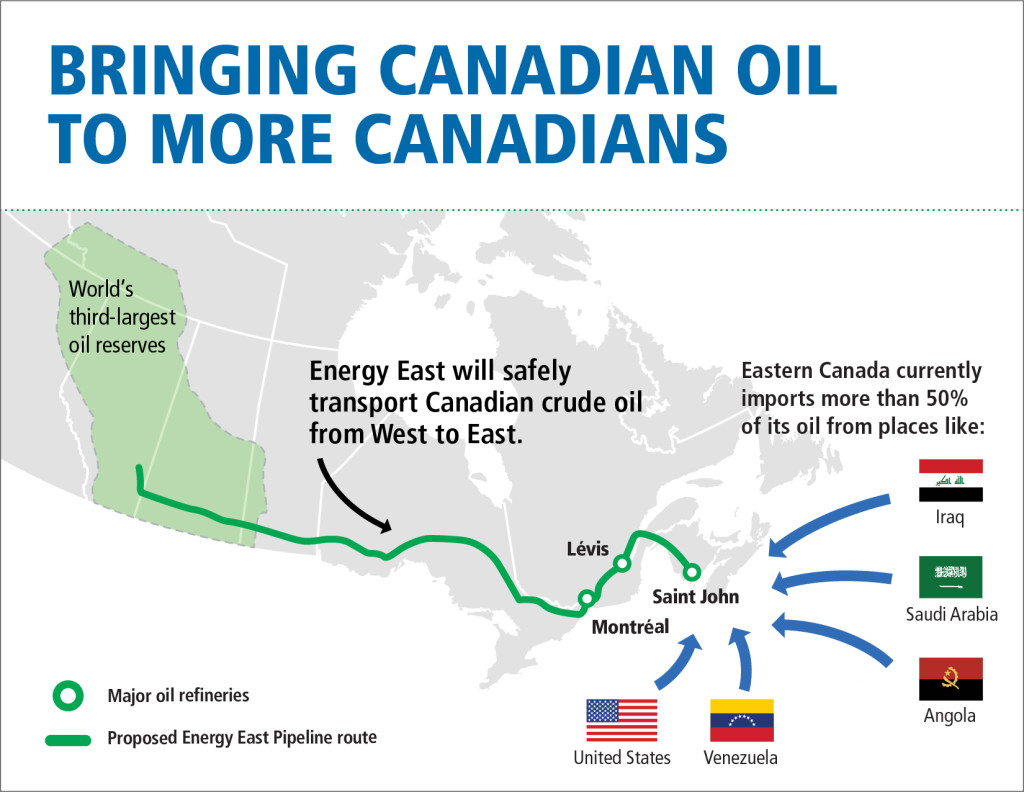It was proposed as a project to transform Canada — an oil pipeline stretching from Alberta to refineries on the East Coast — but the company behind the Energy East plan abruptly announced on Thursday that they are shelving the multibillion-dollar project, citing regulatory hurdles.Low oil prices also likely played a role in the decision to scrap the project with an estimated price tag of $15.7 billion. Energy East was first proposed at a time when oil prices hovered around $100 per barrel. As of Thursday, the price of oil sat at roughly half that.The 4,600km pipeline plan, designed to ship 1.1 million barrels of oil daily, faced opposition from environmentalists and First Nations, who feared spills and leaks could contaminate drinking water for 5 million Canadians.Eastern Canada currently imports more than half of its oil from countries such as Saudi Arabia, Iraq, Angola and the U.S., according to TransCanada, and replacing those imports with Albertan crude would have helped Canada become more self-reliant for its fuel. “We believe this nation-building project would have benefited all of Canada through new jobs, investment, energy security and the ability to displace oil being imported into Canada,” Alberta Premier Rachel Notley said in a statement lamenting the collapse of the plan. She wants government regulators, specifically the National Energy Board (NEB), to clarify the approval process for big infrastructure projects.Environmentalists, on the other hand, declared victory. “The end of Energy East shows that extreme energy projects are part of our past not our future,” Maude Barlow from the Council of Canadians said in a statement. “For all of our sakes, Kinder Morgan, Line 3, Line 10 and Keystone XL must face the same fate,” Barlow said of other proposed pipelines.
“We believe this nation-building project would have benefited all of Canada through new jobs, investment, energy security and the ability to displace oil being imported into Canada,” Alberta Premier Rachel Notley said in a statement lamenting the collapse of the plan. She wants government regulators, specifically the National Energy Board (NEB), to clarify the approval process for big infrastructure projects.Environmentalists, on the other hand, declared victory. “The end of Energy East shows that extreme energy projects are part of our past not our future,” Maude Barlow from the Council of Canadians said in a statement. “For all of our sakes, Kinder Morgan, Line 3, Line 10 and Keystone XL must face the same fate,” Barlow said of other proposed pipelines.
Advertisement
Expanded oil extraction in the Alberta tar sands to supply the pipeline would also have made it impossible for Canada to meet its commitments to reduce climate change, environmentalists said.“After careful review of changed circumstances, we will be informing the National Energy Board that we will no longer be proceeding with our Energy East and Eastern Mainline applications,” Russ Girling, the CEO of Calgary-based TransCanada, said in a statement.The pipeline would have crossed the territory of more than 50 First Nations, many of whom opposed the plan and declined to give consent for it to go forward.Canceling the pipeline will cost TransCanada about $1 billion dollars, the company said.“In light of the project’s inability to reach a regulatory decision, no recoveries of costs from third parties are expected,” Girling said.“In light of the project’s inability to reach a regulatory decision, no recoveries of costs from third parties are expected”
Supporters say the pipeline would have created thousands of jobs and allowed Eastern Canada to reduce its oil imports from unstable countries in the Middle East.“We believe this nation-building project would have benefited all of Canada through new jobs, investment”
Advertisement

The decision to shelve Energy East follows a report this week from the Paris-based International Energy Agency (IEA) showing an exponential growth in renewable energy production and decreased costs for solar power.Renewables such as wind and solar power could become cheaper than fossil fuel investments in the next five years, according to IEA officials, and renewable energy accounted for two-thirds of the new power supply added to the world’s grids last year.“The era of expensive renewables is over,” said Fatih Birol, executive director of the IEA.In light of the decision to axe Energy East, environmentalists say other major energy pipelines, including the Keystone XL which has support from Donald Trump to move oil from Alberta to Oklahoma, and on to the U.S. Gulf Coast., are now in jeopardy.“The era of expensive renewables is over”
